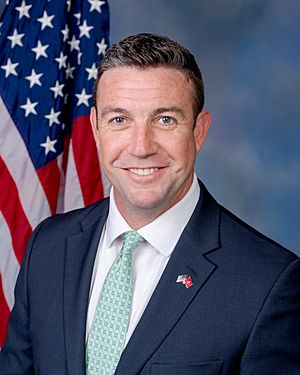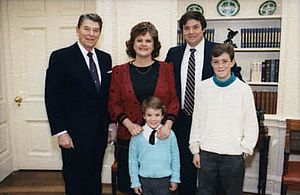Duncan D. Hunter facts for kids
Quick facts for kids
Duncan Hunter
|
|
|---|---|
 |
|
| Member of the U.S. House of Representatives from California |
|
| In office January 3, 2009 – January 13, 2020 |
|
| Preceded by | Duncan L. Hunter |
| Succeeded by | Darrell Issa |
| Constituency | 52nd district (2009–2013) 50th district (2013–2020) |
| Personal details | |
| Born |
Duncan Duane Hunter
December 7, 1976 San Diego, California, U.S. |
| Political party | Republican |
| Spouse |
Margaret Jankowski
(m. 1998; div. 2023) |
| Children | 3 |
| Relatives | Duncan L. Hunter (father) |
| Education | San Diego State University (BS) |
| Military service | |
| Allegiance | |
| Branch/service | |
| Years of service | 2001–2005 (active) 2005–2017 (reserve) |
| Rank | |
| Unit | 1st Battalion, 11th Marines |
| Battles/wars | War in Afghanistan Iraq War |
| Criminal details | |
| Criminal status | Pardoned |
| Criminal charge | Conspiracy to Steal Campaign Funds – Title 18, U.S.C., Sec. 371 |
| Penalty | 11 months in federal prison |
Duncan Duane Hunter (born December 7, 1976) is an American former politician and a U.S. Marine. He served as a U.S. Representative for California from 2009 to 2020. He is a member of the Republican Party.
Hunter was first elected to the House in 2008. His district covered parts of San Diego County and Riverside County. He served in the U.S. Marines from 2001 to 2005. He took over the congressional seat from his father, Duncan Lee Hunter, who had been a member of Congress since 1981.
In 2017, an investigation began into Hunter and his wife, Margaret, for how they used campaign money. In 2018, they were charged with misusing funds. Margaret Hunter pleaded guilty in 2019. Duncan Hunter also pleaded guilty in December 2019 to misusing campaign funds. He resigned from Congress in January 2020 and was sentenced to prison. However, he was later pardoned by President Donald Trump in December 2020.
Contents
Early Life and Education
Duncan Hunter was born in San Diego, California. His parents are Helynn Louise and Duncan Lee Hunter. He finished high school at Granite Hills High School in El Cajon, California, in 1994.
He then went to San Diego State University. In 2001, he earned a degree in information systems. While in college, he started a web design company with a friend. After graduating, he worked as an information technology business analyst in San Diego.
Military Service
After the September 11 attacks, Hunter joined the United States Marine Corps. He went to Officer Candidates School and became a second lieutenant in March 2002. He served as a field artillery officer in the 1st Marine Division during the 2003 invasion of Iraq.
He completed a second tour in Fallujah, Iraq, in 2004. During this time, he was part of Operation Vigilant Resolve. On April 12, 2004, a mortar was mistakenly launched onto a schoolhouse where U.S. troops were based. Two U.S. Marines and an Iraqi interpreter died, and several others were injured. Hunter was working in the command center that approved the launch.
In September 2005, Hunter left active duty. He then started a company that built homes. In 2007, he was called back to active duty and went to Afghanistan. He was promoted to captain in 2006 and to major in 2012. Hunter stayed in the Marine Corps Reserve until 2017.
In April 2023, a report from NPR discussed the 2004 friendly fire incident. The report suggested Hunter was partly responsible. Hunter stated he was a trainee and worked under another officer's supervision. The other officer said it was Hunter's call but also took some blame. A military investigation of the incident was never made public.
U.S. House of Representatives
Becoming a Representative
In 2007, Hunter's father, Duncan Lee Hunter, announced he would not run for re-election. This opened up his congressional seat. Duncan Hunter decided to run for the seat.
While running for office, he was called back to serve in the War in Afghanistan. On June 3, 2008, Hunter won the Republican primary election. He then won the general election, defeating Democratic candidate Mike Lumpkin. Hunter became the first combat veteran from either Iraq or Afghanistan to serve in the U.S. Congress.
Serving in Congress
Hunter was re-elected several times. In 2012, after district boundaries changed, his district became the 50th District. He continued to represent this area.
During his 2018 re-election campaign, Hunter made claims about his opponent, Ammar Campa-Najjar. These claims were criticized by many news organizations as unfair and misleading. Despite the controversy, Hunter won the election, though by a smaller margin than usual.
As a representative, Hunter often voted in line with conservative ideas. He supported tax cuts and wanted to repeal the Affordable Care Act. He also had strong views on environmental issues, disagreeing with the scientific consensus on climate change.
Hunter was an early supporter of Donald Trump's presidential campaign in 2016. He was one of the first members of Congress to endorse Trump.
In 2019, the Marine Corps asked Hunter to stop using their emblem on his political mailers. They explained that federal law prevents using military symbols for political purposes.
Resigning from Committees
On August 22, 2018, after being charged with federal crimes, Hunter had to resign from all his Congressional committees. These included the Committee on Armed Services and the Committee on Transportation and Infrastructure.
Campaign Finance Investigation and Pardon
Investigation and Charges
In April 2016, questions arose about Hunter's use of campaign money for personal expenses. An ethics group filed a complaint. In August 2016, the Office of Congressional Ethics recommended a full investigation. Hunter and his wife, Margaret, who was his campaign manager, used a campaign credit card for various personal items. These included video games, travel, clothing, and groceries.
In February 2017, the FBI raided Hunter's campaign offices. They seized computers and financial records. In March 2017, the House Ethics Committee announced that the Department of Justice was investigating Hunter for campaign finance violations. Hunter stated he had repaid about $60,000 to his campaign and denied doing anything wrong on purpose.
On August 21, 2018, a federal grand jury charged Hunter and his wife with misusing $250,000 in campaign funds for personal expenses. These expenses included vacations and other purchases. The charges also stated that Hunter spent campaign money on "personal relationships" with five women. The indictment noted that the Hunters spent much more money than they earned.
Guilty Plea and Sentence
On August 23, 2018, both Hunter and his wife pleaded not guilty. Hunter suggested his wife was responsible for any mistakes, saying she managed their finances.
On June 13, 2019, Margaret Hunter pleaded guilty to one charge of corruption. She admitted to working with her husband to spend over $200,000 in campaign funds on personal things. She agreed to cooperate with the prosecution.
On December 3, 2019, Duncan Hunter changed his plea to guilty for one charge of misusing campaign funds. He expected to go to prison. On March 17, 2020, he was sentenced to eleven months in prison, followed by three months of supervised release.
Margaret Hunter was sentenced in August 2020 to eight months of home confinement and three years of probation.
Resignation and Pardon
On December 5, 2019, the House Ethics Committee told Hunter he should not vote in Congress because he had pleaded guilty to a serious crime. On December 6, 2019, Hunter announced he would resign from Congress after the holidays. He officially resigned on January 13, 2020.
In December 2020, President Donald Trump pardoned Duncan Hunter. The next day, Trump also pardoned Margaret Hunter. This meant Duncan Hunter did not have to serve his prison sentence. However, in 2022, fines for both were upheld by the Federal Election Commission.
Personal Life
In 1998, Duncan Hunter married Margaret Elizabeth Jankowski. They have three children. In 2016, Hunter sold his home and used some of the money to repay his campaign. He and his family then moved in with his father.
Margaret Hunter filed for divorce from Duncan Hunter in November 2020. Their divorce was finalized on January 31, 2023. She then began using her maiden name, Jankowski.
 | Kyle Baker |
 | Joseph Yoakum |
 | Laura Wheeler Waring |
 | Henry Ossawa Tanner |


